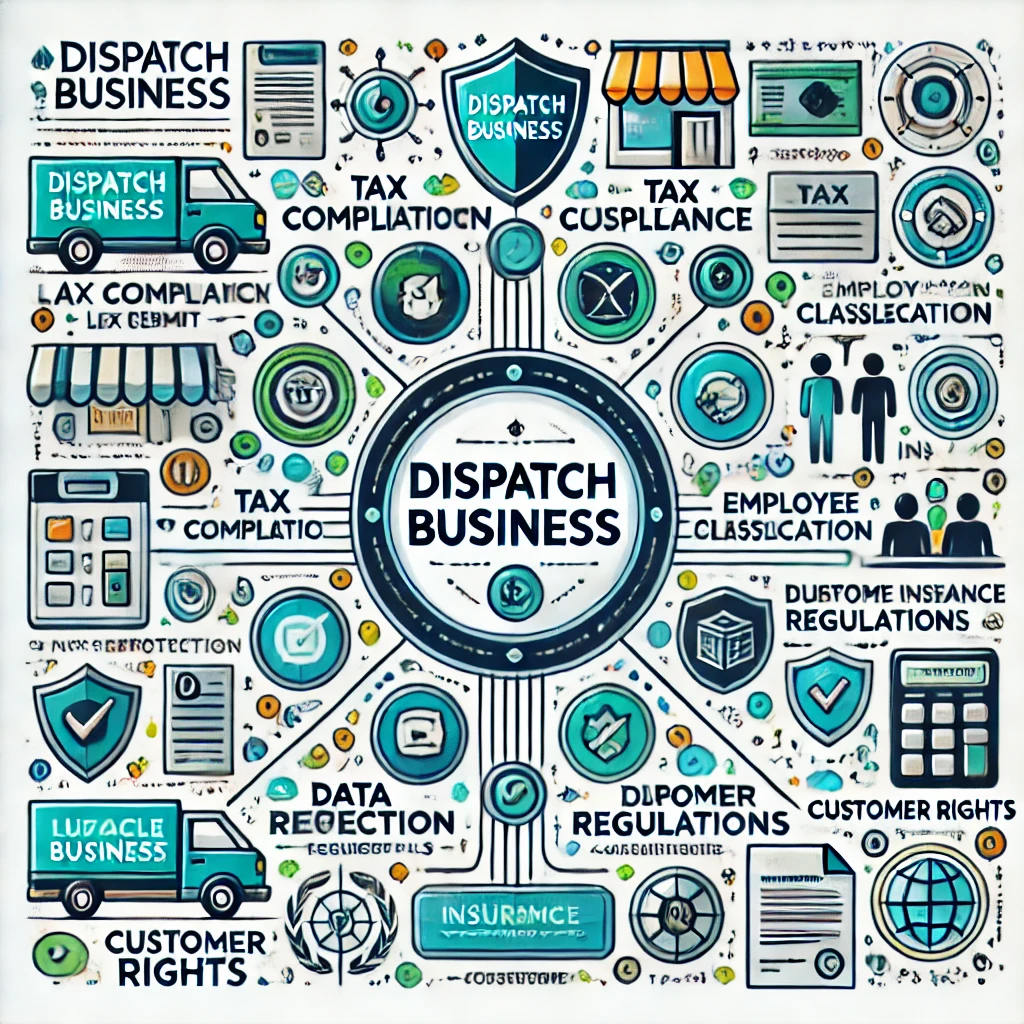Dispatch businesses are vital to industries such as transportation, logistics, and limousine services. However, navigating the legal requirements for dispatch businesses can be challenging. From licensing to data protection, businesses must understand and comply with various regulations to avoid penalties and ensure smooth operations. This comprehensive guide explores the legal landscape, challenges, and solutions to help dispatch businesses meet their legal obligations effectively.
1. Licensing and Permits: The Foundation of Legal Compliance
The Issue:
Obtaining the necessary licenses and permits is often the first hurdle for dispatch businesses. Each jurisdiction has unique requirements, and failing to secure proper documentation can lead to fines or shutdowns. For example, a limousine dispatch service may need both local and federal permits, depending on its operational area.
The Solution:
- Research Local Regulations
Begin by researching the licensing requirements in your operational jurisdiction. Most local government websites provide detailed information. Pay attention to specifics such as commercial vehicle permits and zoning approvals. - Seek Expert Guidance
Hiring a legal advisor or consultant familiar with dispatch businesses can simplify the process. They can guide you through applications and ensure compliance. - Maintain a Checklist
Regularly update a checklist of all required permits and licenses. Include renewal dates to avoid lapses. Automation tools can also help track these deadlines efficiently.
2. Tax Compliance: Staying Ahead of Financial Obligations
The Issue:
Taxes can be a complex area for dispatch businesses, especially those operating across state lines or dealing with multiple revenue streams. Non-compliance can result in audits and financial penalties.
The Solution:
- Hire a Tax Specialist
Work with a tax specialist who understands the nuances of dispatch businesses. They can help identify deductions, manage multi-jurisdictional taxes, and file returns accurately. - Implement Reliable Software
Use accounting software tailored for dispatch and transportation businesses. These tools can automate calculations and ensure accurate reporting. - Educate Your Team
Train your administrative staff on basic tax rules and documentation requirements. This minimizes errors in record-keeping and reporting.
3. Insurance Coverage: Protecting Your Business
The Issue:
Insurance is a critical requirement but often misunderstood by dispatch businesses. Coverage gaps can expose businesses to lawsuits or financial losses.
The Solution:
- Understand Mandatory Policies
Familiarize yourself with mandatory insurance policies such as general liability, commercial auto insurance, and worker’s compensation. - Customize Your Coverage
Tailor your insurance policies to address unique risks, such as those faced by limousine dispatch services, which may require higher liability limits. - Regularly Review Policies
Schedule annual reviews of your insurance coverage to ensure it aligns with evolving business needs and legal requirements.
4. Data Protection and Privacy Laws: Safeguarding Customer Information
The Issue:
Dispatch businesses often handle sensitive customer data. Failure to comply with data protection laws like GDPR or CCPA can result in severe penalties.
The Solution:
- Invest in Secure Systems
Use dispatch software with robust security features such as encryption and multi-factor authentication. - Train Employees
Conduct regular training sessions on data privacy regulations and best practices. - Develop a Privacy Policy
Create a transparent privacy policy outlining how customer data is collected, used, and protected.
5. Employee Classification: Avoiding Misclassification Risks
The Issue:
Misclassifying employees as independent contractors can lead to legal disputes and penalties.
The Solution:
- Understand Employment Laws
Study local labor laws to determine whether workers should be classified as employees or contractors. - Consult an HR Specialist
Work with an HR consultant to develop compliant contracts and policies. - Document Roles Clearly
Maintain clear job descriptions and agreements for all workers.
6. Contract Management: Building Strong Agreements
The Issue:
Poorly drafted contracts can lead to disputes with clients or vendors.
The Solution:
- Use Standardized Templates
Develop standardized contract templates reviewed by a legal expert. - Include Key Clauses
Ensure contracts address payment terms, cancellation policies, and liability clauses. - Digitize Contracts
Use contract management software to streamline tracking and updates.
7. Vehicle Regulations: Ensuring Fleet Compliance
The Issue:
Non-compliance with vehicle regulations can result in fines and operational disruptions.
The Solution:
- Conduct Regular Inspections
Schedule regular inspections to meet safety and emission standards. - Keep Documentation Updated
Maintain current registration and inspection certificates for all vehicles. - Train Drivers
Train drivers on regulatory requirements and safety protocols.
8. Customer Rights and Dispute Resolution
The Issue:
Dispatch businesses must navigate disputes while ensuring customer satisfaction and compliance with consumer protection laws.
The Solution:
- Establish Clear Policies
Develop clear policies on cancellations, refunds, and service standards. - Use Mediation Services
Consider mediation as a cost-effective way to resolve disputes. - Document Interactions
Keep detailed records of customer communications and complaints.
9. Accessibility Requirements: Serving All Customers
The Issue:
Failure to meet accessibility requirements can limit your customer base and result in legal action.
The Solution:
- Modify Vehicles
Equip vehicles with ramps or lifts to accommodate disabled customers. - Train Staff
Train staff on providing inclusive and respectful services. - Promote Accessibility
Highlight your accessible services in marketing efforts.
10. Continuous Legal Education: Staying Updated
The Issue:
Laws and regulations are constantly evolving, making it challenging for businesses to stay compliant.
The Solution:
- Join Industry Associations
Membership in industry associations can provide updates on legal changes. - Attend Workshops
Participate in workshops and seminars on legal compliance. - Subscribe to Legal Updates
Subscribe to newsletters or alerts from legal experts in the dispatch industry.
Conclusion
Understanding and adhering to dispatch business legal requirements is not only essential for compliance but also for building trust with clients and stakeholders. By addressing challenges proactively and implementing effective solutions, businesses can focus on growth while minimizing legal risks.
For reliable dispatch and customer support services, consider Saztech Solutions. Visit their website at https://www.saztech-solutions.com/ to explore tailored solutions that meet your business needs.
Home | About Us | Pricing | Get Started | FAQ | Dispatch Daily | Contact Us
WhatsApp | Facebook | LinkedIn





Leave a Reply